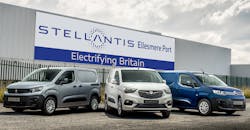Stellantis Commits $140M to BEVs in UK
A Vauxhall Motors plant in northwest England will be the first Stellantis plant to produce a solely battery-electric vehicle by the end of 2022. The automaker has committed £100 million ($140 million) in updates to the plant at Ellesmere Port, an investment that is "supported by the U.K. government," according to an announcement, suggesting incentives based on the scope of the investment, which in the case of some other manufacturers has amounted to as much as 10%.
Stellantis outlined that Ellesmere Port will be updated with a new body shop, improved general assembly operations, a newly established battery-pack assembly plant, as well as “a compression of the site area.” “In addition, there will be further support to enable a pathway to carbon neutrality for the plant by the middle of this decade,” according to the automaker. “The plant aims to be 100% self-sufficient for electricity and work will commence imminently on potential wind and solar farms.”
The group also noted the plant’s new dedication to BEVs will contributed to achieving the U.K. government’s decision to stop sales of gas- and diesel engined vehicles starting in 2030.
“Performance is always the trigger for sustainability and this £100-million investment demonstrates our commitment to the U.K. and to Ellesmere Port,” Stellantis CEO Carlos Tavares said. “Producing battery electric vehicles here will support clean, safe, and affordable mobility for the citizens. Since 1903 Vauxhall has manufactured vehicles in Britain and we will continue to do so.”
Ellesmere Port will produce a series of battery-electric passenger cars and another of light commercial vehicles, both series to be branded for Vauxhall, Opel, Peugeot, and Citroën, and both produced domestic and export markets. The latter point is noteworthy inasmuch as it will offset doubts about the viability of British manufacturing following the nation’s exit from the European Union.
Both the commercial vehicles and passenger cars will be powered by a 100-kW (136-hp) motor with a 50-kWh lithium-ion battery and a projected driving range of 174 miles. They will be chargeable at up to 100 kW, with 30 minutes required to charge from 0 to 80%.
